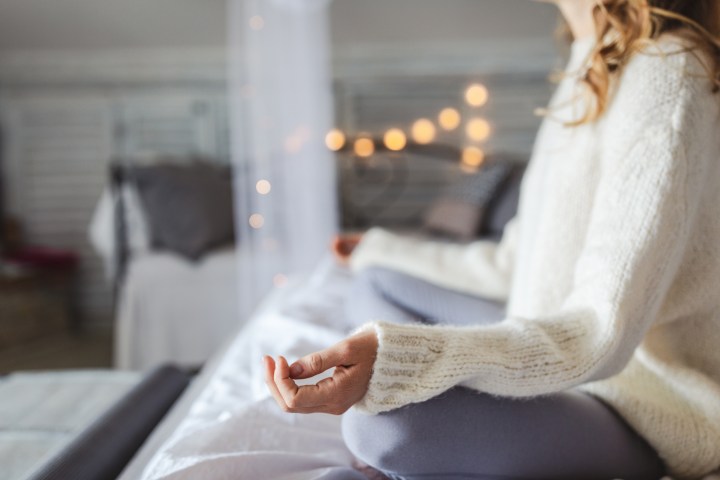The art of silence

We all know what silence means. Yet how many of us have experienced it? In our day-to-day lives, most of us are absolutely bombarded by sound and visual stimuli. We lurch from one activity to the next feeling stressed and overwhelmed. Today Amber Hatch offers us an antidote.
What is the art of silence?
We may recognise that our lives are too busy and too noisy and we need to bring in a little more peace. Perhaps we want to slow things down, or maybe we just want to learn how to make the best use of the quieter periods that we already have. We look for something of the spirit of silence, because we intuitively know that more of things – more stuff or more stimulation – is not going to lead to greater happiness.
The notion of silence can help us redress the balance of this crazy, chaotic world that we live in. It can give us the space we need to allow our bodies and minds to relax, so that we can become the healthy, wholesome individuals we want to be.
Silence is a strategy for living.
There are three very powerful ways in which we can harness the power of silence and bring more of it into our lives.
Quieting the environment
We can make changes to the world around us. We can do this by spending time in quieter places, and by engaging in activities that are conducive to calm. We can think of this as setting the conditions for silence.
Cultivating peaceful relationships
The way in which we interact with those around us has a huge impact on the quality of our lives. We can bring peace into our conversations and our way of being with others. This is a way for us to ‘act out’ our silence.
Nurturing an inner silence
By working with the mind, we can learn how to cultivate a sense of inner silence. We can draw from this whatever the circumstances of the moment are.
Making space for silence
Feeling as though we are not on top of things is a major cause of stress. So, why is it that we have so much stuff to do? We only have a set amount of time in each day, and there is a limit to how much we can squeeze into that time – we can only go so fast. Yet so many of us feel as if we are constantly behind. Of course, there is a certain amount that we have to do each day. We have to prepare and eat our meals, we may need to care for our children, we need to clean and maintain our home and we probably have work to do. For most of us, it isn’t possible or appropriate to simply lie in bed all day doing nothing. However, many of us feel we need to do far more than just the basics of living.
Inevitably, there will be times in our lives when everything will be going faster than we find comfortable, for example when we have a major work deadline, or are building up for a big occasion such as a wedding or house move. At times like these we’ll need to draw on our inner reserves rather than try to ‘fix’ the situation. I talk more about this in part 3. However, if it feels as though you are being dragged along on an intercity train all the time, then you probably need to do something about it. You won’t be able to create space and silence if you are constantly on the back foot.
Given that you cannot create more hours, you only really have one option, which is to reduce the number of tasks. Sometimes it can seem utterly impossible to see where you can cut back. You may feel so overloaded that you don’t even have time to take a step back and see what can be done. Yet making even the smallest of adjustments can have a major impact on your stress levels. Creating gaps around your tasks (even small ones) allows pockets of silence to filter through to your busy life. So where should you begin?
Prioritise what’s important – lose what is not
Take some time to think through your week and consider what’s really important to you. It might be essentials such as having a shower and taking the dog for a walk, or activities you wish you could make time for, such as baking with the children, reading a book or having a glass of wine with your partner. Are you allowing enough time to do these things, so that you can do them in an unhurried way and take pleasure in them? Or are you just cramming them in between other jobs (if you manage to do them at all, that is)?
If you haven’t got time for the things that are important to you, it may be necessary to let go of some of your activities. You may feel so committed to certain activities and projects that giving them up seems impossible. However, taking stock of what you are currently signed up for can help you to work out if you are doing too much. Sometimes we carry on doing things long after we stop enjoying them because we feel guilty about giving them up. There are other things that we do enjoy, but it may be that we are signed up for so many activities that we feel continually rushed.
At times we feel constricted by activities that we have agreed to do on behalf of other people. Parents often spend a lot of time ferrying children around from one activity to the next. Are the children doing too much? Check whether you may have overfilled their timetables, too. Sometimes it can be hard to let go of activities that may have been important at one time but are now not so necessary. For example, if your children take swimming lessons, it may not be necessary for them to have them throughout the year. If you volunteer for a project, perhaps you can take a break at times. Cutting down your activities doesn’t mean that you have to abandon them completely. You can just say, ‘No, not this time,’ or ‘Let’s see about that in a couple of months.’ If you are the type of person who always says yes to things, saying no (or no, not now) can be extremely powerful. Giving up just one job or responsibility can make a big difference to the overall feel of your week.
On a practical level, if you are engaged in fewer activities this literally allows you more time. Instead of immediately filling it with chores or other jobs, you can allow moments of silence to arise in the gaps. Pauses provide opportunities to appreciate and enjoy the activities you do retain, which can be hard when you are rushing from one thing to another.
On a psychological level, starting to say no can represent a switch to a more conscious way of living. When you review your activities and carefully choose which ones to take on or continue, you are fostering a calm, unhurried attitude towards life. Rather than being ruled by circumstances, trying to make do as best you can, you are making a conscious choice. This can contribute to a sense of internal silence and calm, which is discussed in more depth in part 3.
Questions to consider before saying ‘Yes’
- Is it essential?
- Does it make you happy?
- Does it make you more happy than relaxing at home?
- Does it bring happiness to others?
- Do you have enough time to do it justice?
- Will you be so rushed that you will find it difficult to be calm?
- Is it something you need to do?
Realistic expectations about what you ‘ought’ to be doing
We are bombarded with messages about how we should be living our lives. We are told that we should be having fun in many different ways. Yet the only person who can oversee the whole is you. Check that you don’t have unrealistic expectations about how much you can do. You could be left feeling continually disappointed when you don’t get to do everything, or may end up perpetually rushed as you try to squeeze everything in.
So, for example, you might nurture a beautiful fantasy of building a tree house with your child, or of indulging in a candle-lit bath. These are lovely things to do, but it’s OK for them to be special. You don’t have to be doing them every week. Feeling guilty about not fitting in ‘quality time’ (for yourself or with others) can also contribute to feeling overly committed.
Too much choice
One factor that contributes to feeling overwhelmed is having too much choice. For a long time advertising has led us to believe that choice is a good thing. We have come to believe that we are entitled to choose pretty much anything – our clothes, holidays, food (regardless of what season it is), cars, music and electronic devices. Yet this proliferation of choice is really very confusing and stressful. Choosing also takes time. Every time we need to make a decision, we spend a bit of mental energy working out what to do (what to eat, cook or watch).
Embracing simplicity is a way to counteract this overabundance. Fewer choices to make also result in less internal chatter from making endless decisions. This is not to say that we should never have any variety – it is the ‘spice of life’, after all. But spice should be used in small doses. We don’t want to ladle out a big bowl of it for every meal. In the meantime, it’s fine to keep wearing the same outfit until it needs washing. It’s fine to have pasta every Thursday. You don’t need to switch to a new shampoo every time it runs out.
Keeping things simple and rejecting over-consumption will bring relief in the short term, but you might also find that it has longer term consequences. Once you reduce the need to keep buying and consuming both goods and experiences, you may find that you don’t need to work so hard and earn as much money. You may even find that you can downsize. Perhaps that means working fewer hours, or switching to a job that pays less but fills you with joy. You may find that you want to move to a smaller house, so that you can spend less time organising and tidying your belongings and your home. All these changes can free up more time for space and silence.
EXERCISE: Write out your timetable
Take a piece of paper and write out a simple timetable of all the jobs that you are involved with each day. Use a highlighter to mark the jobs that are absolutely essential. Use a different-coloured highlighter to mark the ones that bring you real pleasure. See whether you can simplify or prune what is left.
Amber Hatch is a writer, teacher and childminder. She is a parenting and mindfulness expert, and runs numerous classes and groups for parents in Oxford. The Art of Silence is out now.







